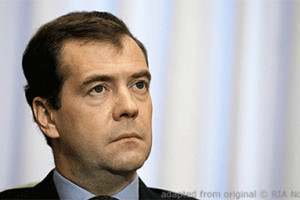RUSSIALINK TRANSCRIPT: “Dmitry Medvedev on the strategic goals of the country’s development” – RIA Novosti

The start of the year provides an excellent opportunity to talk about plans and prospects. A great goal stands before us – accelerating development in key areas of the economy and the social sphere. And there is every opportunity to achieve this. I am talking about 12 national projects. Their cost along with the infrastructure plan is R25,700 bn (391 bn dollars). This sum is just as colossal as its importance for present and future Russia. Our challenge is that people across the whole country will say: “I like the life that I am living”.
The government shall find the “solution to the equation” of national success through accelerating economic growth. Why is this important? Every resident of the country benefits from a developed economy. And I am sure that in six years’ time the Russian economy will have a powerful “gravity”. It will be able to attract the best minds and ideas, both domestically and from abroad.
A great deal of work is needed for this.
First. Give people the opportunity to do what they love for a good salary. And most importantly to live longer and enjoy life. To do this we will improve the health care system. Our immediate plans include building and repairing children’s clinics, fighting against cancer, cardiovascular and other serious diseases, and improving the quality and availability of medicines. Medical care in general – I am talking about the development of air ambulances and remote treatment formats.
But the recipe for success lies not only in good health, but also in quality education. And here, too, much depends on the state. We must make a serious, I would even say, advanced breakthrough. So that consumers of scientific and technological innovations will turn into their creators. For this, it is necessary to introduce the latest programmes and methods, to develop additional education, and to support higher education establishments as “innovative laboratories”. Not to convince a pupil, a student, a young scientist that “this is impossible”, but to say – try. And to create all the conditions for this.
Second. Improve the quality of investment in fixed capital – and their amount – to 25 per cent of GDP. For this, we will start to more intensively develop transport, digital and energy infrastructure. We will assign trillions of roubles for the construction of new factories, roads, and power plants. And for the development and deployment of advanced technologies.
Third. Revise supervisory and control standards. Those not approved or changed will automatically become invalid. This is the so-called regulatory guillotine. The term very accurately reflects the essence of the process: cutting off excess regulation of business.
Finally, the fourth factor of development is Russia’s involvement in the global economy. Here the challenge is to significantly increase the export of goods and services. And we have something to offer. These are products and medicines, education, and innovative technologies.
They are trying to stop Russia, and they will try. We are constantly under pressure from certain states which play the role of the “world gendarmes” or “speed bumps” that hinder momentum-gathering.
But sanctions also have a flip-side. We have learned to live and develop in conditions of total pressure. Only three or four years ago, oil prices predetermined the state of all economic conditions in the country (the rouble exchange rate, inflation, interest rates, economic growth and people’s well-being). And now the domestic parameters barely react to fluctuations in oil market prices.
Over the past few years, we have created a healthy macro-economic system that has a strong immunity to external shocks. A careful budget and monetary policy has helped not only to recover from the most powerful crisis in the last half century, but also to begin work on new tasks – on national projects.
They must strengthen Russia. All of us. To help achieve strategic development goals. So that in 2024, looking back, we will be at liberty to say: we did everything that we planned.
